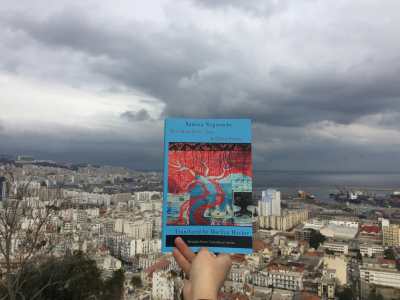On Translation, Collaboration, and ‘Exploring the Impossible Between Us’
Recently, ArabLit’s chief editor wrote about The Olive Trees’ Jazz (by Samira Negrouche, tr. Marilyn Hacker) on MEE:

For the interview-review, I talked with both Hacker and Negrouche about the collection and their nearly decade-long collaboration.
One thing that didn’t make the piece was a question to Hacker about how she knows when it’s going to be a few poems, and when she knows she’s committing to translating a whole manuscript, and how much shared (literary) past she needs with the poet:
Marilyn Hacker: Often it’s an accretion of material: at a certain moment I realize that there are enough translated poems, or almost enough, to make a book, whether or not it corresponds exactly with (just) one of that poet’s collections.
Each of my experiences with translation has been different. Translating Claire Malroux grew out of a personal and professional encounter, that I’ve described in an essay, whereas my translating Vénus Khoury-Ghata started when I read some howler-filled translations in an anthology a publisher asked me to review. . . . which led me to re-translate the poems, seek out her books, and eventually meet her. The next book of translations, to be published by Yale, is of Jean-Paul de Dadelsen, who died young in 1957, and whose work was published posthumously .
Fadwa Suleiman was a friend. Golan Haji is a friend, and himself a brilliant translator from English to Arabic. I hope the day comes when my Arabic is adequate to translating an entire book of his. Probably I shared more of a literary history with Dadelsen, trilingual in French, English and German, reading Auden and MacNeice while working at the BBC after World War II, than with some living poets whose work I not only admire but frequently reread, as well as translate. Trying to hear the echoes has broadened my own reading, and this goes for poets whose work I love, read, and return to whether or not I translate them. Someone can read Darwish with no knowledge of classical Arabic poetry, and of the preceding early Arab modernists, but it isn’t the same reading. And Darwish is only one example….the same could be said of Sa’adi Yussef, and, of course, Adonis.
Also, a question to Negrouche about her collaborations, particularly with artists who work in visual and musical arts:
Samira Negrouche: It [writing] is a very solitary act that welcomes layers of encounters, most of them silent, some others more visible. The whole thing is about respecting the right distance, growing in its own path stimulated by the other, digesting the experience.
I mostly work alone and look for long periods of silence to be able to listen and to write, but in between I accept fully diving into the vertigo of what surrounds me. Poetry seems to me as multilingual; it is also visual and musical even when it isn’t that obvious. Music and visual arts are a way to question my language, to transform its logic, to move lines I forget to think about. The other art is another language and because it is distant, it allows words in a different way. It isn’t that easy and natural to work with someone else but the admiration and the excitement sometimes makes it possible. I could say much more about collaborations, but something that recently appeared to me is that I collaborate with others to explore the impossible between us, because we aren’t yet equals and still have to work towards this.
Read: The Olive Trees’ Jazz: Algiers poet speaks in music of the senses

February 19, 2020 @ 11:35 pm
Many thanks, Marcia, for this wonderful interview.
February 20, 2020 @ 9:56 am
Well…a person really cannot go wrong when chatting with Marilyn & Samira!